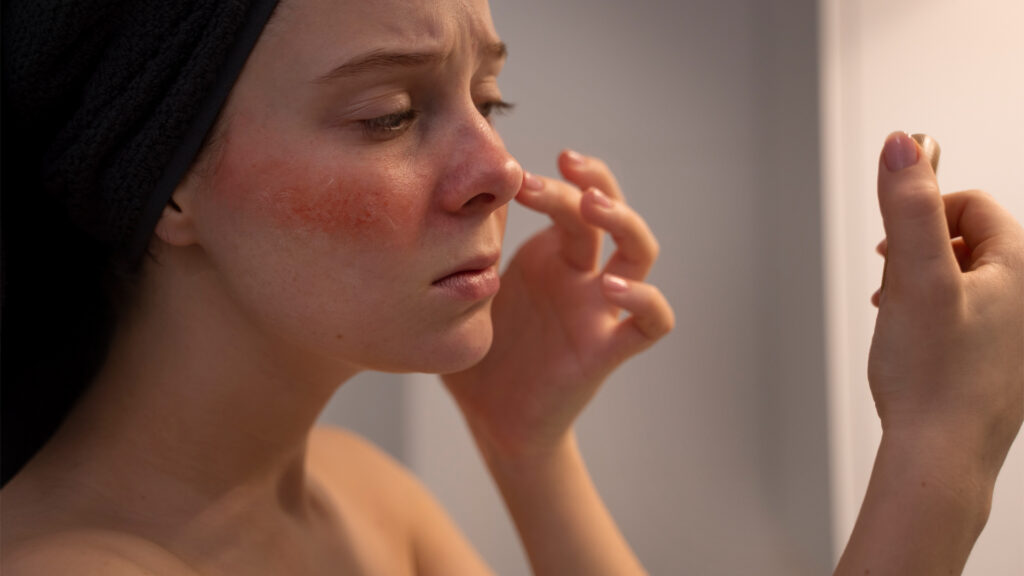Your Ultimate Guide to Managing and Preventing Breakouts, suggested by Goldy Hunjan, best professional makeup artist in Ludhiana Punjab. Skin breakouts can be frustrating and often seem to appear at the worst possible times.
Whether you’re dealing with occasional pimples or persistent acne, understanding the causes and finding the right treatment can make a world of difference. In this blog post, we’ll explore the common triggers of breakouts, effective strategies to manage them, and tips to prevent future flare-ups. Let’s embark on the journey to clearer, healthier skin!
1. Understanding the Causes of Breakouts
Breakouts can be caused by a variety of factors, and identifying the root cause is crucial to effective treatment:
- Hormonal Changes: Fluctuations in hormones, especially during puberty, menstruation, pregnancy, or stress, can increase oil production and lead to breakouts.
- Diet: Certain foods, particularly those high in sugar and dairy, can trigger breakouts in some people.
- Skincare Products: Using products that are too harsh or not suitable for your skin type can clog pores and cause breakouts.
- Environmental Factors: Pollution, humidity, and exposure to harsh elements can irritate the skin and contribute to breakouts.
- Stress: High stress levels can lead to increased oil production and inflammation, which can result in breakouts.
- Genetics: Your genetic makeup can play a significant role in your skin’s tendency to develop acne.
2. Effective Skincare Routine for Managing Breakouts
A consistent skincare routine tailored to your skin’s needs can help manage and reduce breakouts:
- Gentle Cleansing: Use a gentle, sulfate-free cleanser twice a day to remove dirt, oil, and impurities without stripping your skin of its natural oils.
- Exfoliation: Exfoliate 1-2 times a week with a chemical exfoliant containing salicylic acid or glycolic acid to unclog pores and remove dead skin cells. Avoid physical scrubs that can irritate your skin.
- Treatment Products: Incorporate acne treatment products containing ingredients like benzoyl peroxide, salicylic acid, or retinoids. Apply these treatments directly to affected areas.
- Moisturizing: Even if you have oily or acne-prone skin, it’s essential to keep your skin hydrated. Use a non-comedogenic, oil-free moisturizer to maintain your skin’s moisture balance.
- Sun Protection: Apply a broad-spectrum sunscreen with at least SPF 30 daily. Sun exposure can worsen acne and cause hyperpigmentation.
3. Lifestyle Changes for Clearer Skin
In addition to your skincare routine, making certain lifestyle changes can help prevent breakouts:
- Healthy Diet: Eat a balanced diet rich in fruits, vegetables, whole grains, and lean proteins. Limit intake of high-sugar and high-dairy foods, which can trigger breakouts in some individuals.
- Hydration: Drink plenty of water to keep your skin hydrated and help flush out toxins.
- Stress Management: Practice stress-reducing activities such as yoga, meditation, or regular exercise to keep stress levels in check.
- Sleep: Aim for 7-9 hours of quality sleep each night. Lack of sleep can increase stress and trigger breakouts.
- Avoid Touching Your Face: Try to avoid touching your face throughout the day to prevent the transfer of dirt and bacteria that can cause breakouts.
4. Quick Fixes for Emergencies
Sometimes, despite your best efforts, a breakout might still occur. Here are some quick fixes for emergency situations:
- Spot Treatments: Apply a spot treatment with benzoyl peroxide or salicylic acid to reduce inflammation and speed up healing.
- Ice: Use an ice cube wrapped in a clean cloth to reduce swelling and redness. Apply for a few minutes at a time.
- Hydrocolloid Patches: These pimple patches can help absorb excess fluid and reduce the size of the breakout overnight.
5. When to See a Dermatologist
If over-the-counter treatments and lifestyle changes aren’t enough, it might be time to see a dermatologist:
- Persistent or Severe Acne: If your acne is persistent, severe, or causing scarring, a dermatologist can provide prescription treatments like topical retinoids, antibiotics, or oral medications.
- Professional Advice: A dermatologist can help you identify specific triggers and tailor a treatment plan suited to your skin’s needs.
Conclusion
Managing and preventing breakouts requires a holistic approach that combines a consistent skincare routine, healthy lifestyle choices, and, when necessary, professional help. By understanding the causes of your breakouts and taking proactive steps, you can achieve clearer, healthier skin. Remember, patience and persistence are key—clear skin is a journey, not an overnight miracle.

